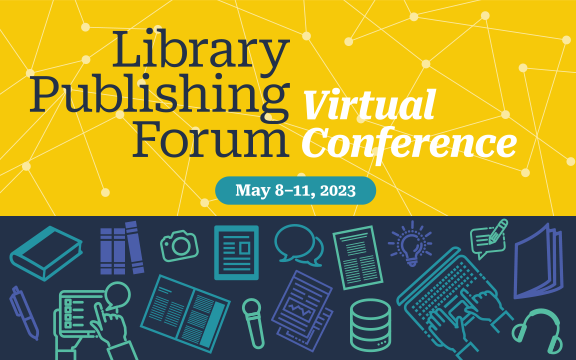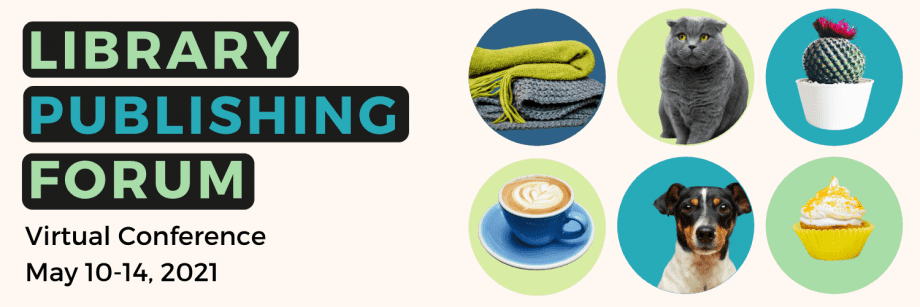
March 29, 2023
2023 Library Publishing Forum Updates: Registration, Program, Keynotes, and Social Events
By Nancy Adams
The Library Publishing Forum (May 8–11, 12 p.m. to 5 p.m. ETD) is virtual this year! Here are the latest updates on registration, program, and keynotes.
Registration
Register now! The registration fee is a super affordable $25 USD for the whole Forum. However, we do not want cost to be a barrier to participation for anyone, so a waived-fee ticket option is also available for those who need it.
Program
The preliminary program for the Forum is available on our website, and it looks great! Full session descriptions are linked on the website and will also be available on our Sched site to registered attendees.
Note that this year there is one active session that has a capped attendance of 40. You can ‘purchase’ a free ticket when you register so don’t wait–this will fill up quickly! Please don’t claim a spot unless you plan to attend; if you do and find you can’t attend please email contact@librarypublishing.org to let us know so we can open the slot to someone else.
Keynotes
Opening and closing keynotes for the conference will focus on ethical issues in the library publishing environment. Our two speakers are
- Dorothea Salo
- Deborah Poff
Social Events
Days on Zoom can be long so this year we want to try ending each Forum day on a more casual and relaxing note. We’ve brainstormed some possible bits and pieces to include:
- Recap/debrief on the day’s sessions
- Birds-of-a-feather sessions
- Speed networking => a series of three or four random 5-minute breakout room sessions
- A Forum pets slideshow
- On Thursday (the final day) more opportunities to provide feedback via discussion/Jamboard
We would like to hear what you want (or absolutely don’t want). Would you be willing to facilitate, i.e., keep the conversation moving, in a birds-of-a-feather session? What topic(s) would you like to discuss? Do you have [another] favorite Zoom social event? Let us know by filling out this brief form. Thank you!
About the Library Publishing Forum
The Library Publishing Forum is an annual conference bringing together representatives from libraries engaged in (or considering) publishing initiatives to define and address major questions and challenges; to identify and document collaborative opportunities; and to strengthen and promote this community of practice. The Forum includes representatives from a broad, international spectrum of academic library backgrounds, as well as groups that collaborate with libraries to publish scholarly works, including publishing vendors, university presses, and scholars. The Forum is sponsored by the Library Publishing Coalition, but you do not need to be a member of the LPC to attend.




